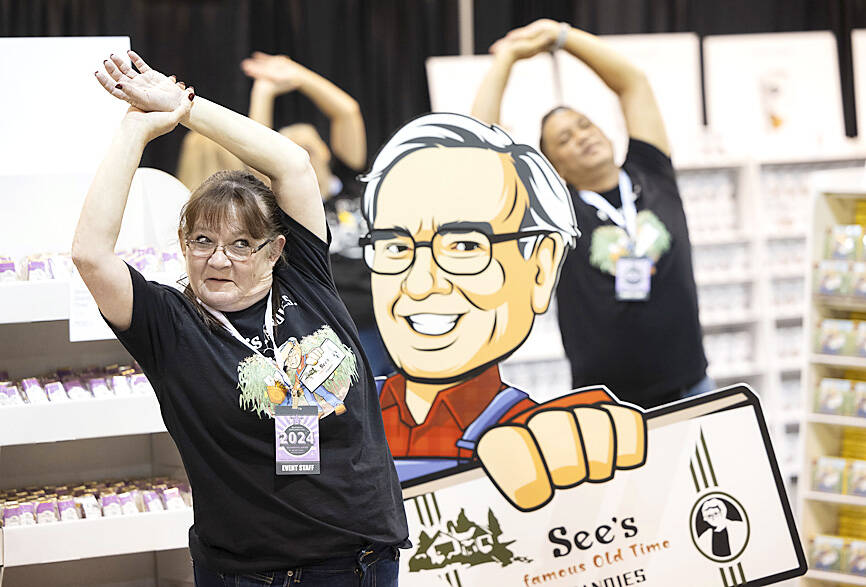Billionaire Warren Buffett slashed Berkshire Hathaway Inc’s massive Apple Inc stake in a move that could prove unsettling for the broader stock market — because the investor is so revered and because there had been little positive financial news lately.
Two years ago, Buffett called the stock one of the four giants of his conglomerate’s business alongside Berkshire insurance, utility and BNSF Railway businesses that it owns outright. That gave investors the impression that Buffett might hold on to Apple indefinitely as he has with the Coca-Cola Co and American Express Co shares he bought decades ago.
However, he has trimmed the Apple stake over the past year and has recently also sold off some of his stock in Bank of America Corp and Chinese electric-vehicle maker BYD Co (比亞迪) while buying little.

Photo: AP
As a result, Buffett is sitting on nearly US$277 billion in cash, up from what was already a record US$189 billion just three months earlier.
“This could alarm the markets especially given the news from last week” with weak tech earnings, a disappointing jobs report and uncertainty about the future of interest rates, Edward Jones Investments analyst Jim Shanahan said.
Buffett has consistently lavished praise on Apple CEO Tim Cook, who attended Berkshire’s annual meeting in Omaha in May, and talked about the way consumers are feverishly devoted to their iPhones and do not like to switch.
He did trim more than 10 percent of Berkshire’s Apple stake in the first three months of this year when he sold off more than 116 million shares, but the sale disclosed on Saturday was a much bigger move.
Wedbush Securities Inc tech analyst Dan Ives said in a research note that he thinks “Buffett is a core believer in Apple and we do not view this as a smoke signal for bad news ahead.”
Apple remains the largest investment in Berkshire’s portfolio by far — more than double its Bank of America stake.
Ives said he thinks the recent tech sell-off is only a temporary distraction from the industry’s long-term boom.
Berkshire did not give an exact count of its Apple shares in Saturday’s report, but it estimated the investment was worth US$84.2 billion at the end of the second quarter even though shares soared over the summer as high as US$237.23.
At the end of the first quarter, Berkshire’s Apple stake was worth US$135.4 billion.
Shanahan said he estimates that Berkshire still holds about 400 million Apple shares.
Still, while CFRA Research analyst Cathy Seifert said she looks at the Apple sale more as responsible portfolio management because the tech giant had become such a large portion of Berkshire’s holdings, it does look like Buffett might be preparing for a downturn.
“This is a company girding itself for a weaker economic climate,” Seifert said.
Berkshire reported a small drop in its bottom-line earnings because of a fall in the paper value of its investments. The company earned US$30.348 billion, or US$21,122 per Class A share, during the second quarter. That is down from US$35.912 billion, or US$24,775 per A share, a year earlier.

South Korea’s equity benchmark yesterday crossed a new milestone just a month after surpassing the once-unthinkable 5,000 mark as surging global memory demand powers the country’s biggest chipmakers. The KOSPI advanced as much as 2.6 percent to a record 6,123, with Samsung Electronics Co and SK Hynix Inc each gaining more than 2 percent. With the benchmark now up 45 percent this year, South Korea’s stock market capitalization has also moved past France’s, following last month’s overtaking of Germany’s. Long overlooked by foreign funds, despite being undervalued, South Korean stocks have now emerged as clear winners in the global market. The so-called “artificial intelligence

NEW IDENTITY: Known for its software, India has expanded into hardware, with its semiconductor industry growing from US$38bn in 2023 to US$45bn to US$50bn India on Saturday inaugurated its first semiconductor assembly and test facility, a milestone in the government’s push to reduce dependence on foreign chipmakers and stake a claim in a sector dominated by China. Indian Prime Minister Narendra Modi opened US firm Micron Technology Inc’s semiconductor assembly, test and packaging unit in his home state of Gujarat, hailing the “dawn of a new era” for India’s technology ambitions. “When young Indians look back in the future, they will see this decade as the turning point in our tech future,” Modi told the event, which was broadcast on his YouTube channel. The plant would convert

‘SEISMIC SHIFT’: The researcher forecast there would be about 1.1 billion mobile shipments this year, down from 1.26 billion the prior year and erasing years of gains The global smartphone market is expected to contract 12.9 percent this year due to the unprecedented memorychip shortage, marking “a crisis like no other,” researcher International Data Corp (IDC) said. The new forecast, a dramatic revision down from earlier estimates, gives the latest accounting of the ongoing memory crunch that is affecting every corner of the electronics industry. The demand for advanced memory to power artificial intelligence (AI) tasks has drained global supply until well into next year and jeopardizes the business model of many smartphone makers. IDC forecast about 1.1 billion mobile shipments this year, down from 1.26 billion the prior

People stand in a Pokemon store in Tokyo on Thursday. One of the world highest-grossing franchises is celebrated its 30th anniversary yesterday.